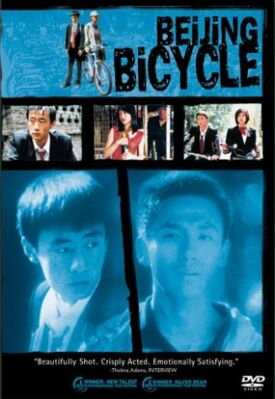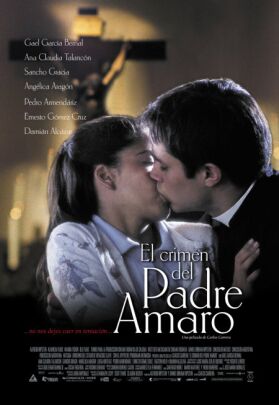Beijing Bicycle (Shiqi sui de dan che)
Re-makes, I think, are almost always a bad idea, but the new re- make by Wang Xiaoshuai of Bicycle Thief (1948), Vittorio De Sica’s great classic of Italian neo- realism, as Beijing Bicycle turns out to be a triumph. It is, wisely, not a copy of the plot or characters of the earlier film, but rather of its theme and its basic scenario, translated into the world of present-day Beijing. Guei (Cui Lin) is a young man of 17 or so just arrived in the big city from the impoverished countryside who gets a job as a bicycle messenger. Along with the job comes a shiny new mountain bike which he is expected to pay for out of his earnings. The company tells him and his fellow recruits, all wearing khaki uniforms and western-style baseball caps with the company logo on them, that it is important for the company’s image that its messengers should ride good-looking bicycles and be well turned-out.
Guei is so successful that he almost has the bike paid for after only a month on the job, and in spite of the office manager’s fiddling of his accounts so as to take a cut of the bike payments for herself. Then one day, as he is comically shunted through a luxury hotel’s spa treatment in search of an elusive Mr Zhang, the bicycle is stolen. Guei is so devastated that he forgets a delivery for Mr Zhang, and he is fired. “You have to deliver it, bike or no bike,” he is told. The delivery is more important than the bike. Besides, the manager has had to grovel to Mr Zhang. Guei begs for his job. But you haven’t got a bicycle anyway, says the manager. “But if I can find it?” he asks. “Will you take me back?” Not for the first or last time in the film, Guei’s “stubbornness” becomes a subject of admiration. But the boss says he’ll take him back if he finds the bicycle — in a city of 12 million people and probably as many bicycles.
While Guei starts his search, we are introduced to Jian (Li Bin) and his family. He lives with his father (Zhao Yiwel) and stepmother and a little step-sister who has just been admitted to an expensive private school. Dad tells Jian, who also goes to private school, that he’ll have to wait to get the bicycle he was promised, on account of the tuition cost for his sister. Jian when not attending school works, as does the whole family, assembling electronic equipment. Most of his school-mates are rich and all have bicycles. As we are introduced to him we see that he has acquired a bicycle in spite of his father, and that it is already bringing him social success in the form of attention from his lovely, bicycle-borne classmate, Xiao (Gao Yuanyuahn). But at night he has to hide the bike — naturally, the one stolen from Guei — rather than take it home with him.
It is important that we feel sympathetic for the social and economic aspirations of both Guei and Jian, and Jian’s father, for what follows is a sort of black comedy that pits the one against the other, once Guei finds his bike and tries to steal it back. Both boys seem equally desperate to hold on to the bicycle and what it represents to him. It also emerges that Jian has bought the bicycle, not knowing it was stolen, from the used bicycle market, but that he has done so with money stolen from the family’s little cache. He tries to justify his action to his father by pointing out that the bike was promised him, and more than once, but that some emergency or other had always prevented him from getting it. “Adults should keep their promises,” he cries out in anger, shame and rage when his father is slapping him for stealing.
The tussle over the bicycle is both comic and horrifying, and it is impossible to disentangle the comedy from the horror. In my favorite scene, Jian’s schoolfriends, who have backed him up in his claims on the bicycle, have Guei surrounded in a parking garage and demand the bicycle back. Though they are many and he is alone, Guei flatly refuses. When the boys try to take it away from him, Guei hurls himself on the bicycle and, clinging to it for dear life, starts screaming. Suddenly the schoolboys, stopped in their violent course by some natural sense of justice or pity, change their approach and try to argue with Guei that, as Jian has paid 500 yuan for the bicycle, Guei should at least pay him something. Guei again refuses, telling them he hasn’t got any money anyway. Again, Guei’s stubbornness is noted. The negotiations continue into the night with neither side willing to relinquish its claims on the bicycle until finally one of the boys’ suggestions that Guei and Jian take the bike on alternate days is accepted.
They try this for a while, but it is not satisfactory on either side, and Jian’s jealousy of Xiao’s interest in the leader of a local gang of bicycle toughs leads to a violent and unhappy ending. Yet, in spite of all that fate and poverty and the crushing indifference of rapidly modernizing Beijing can do to him, “stubborn” Guei remains firm in his stubbornness, the very image of a hero as, bloody and beaten but still carrying his broken bicycle, he marches solemnly in front of a wave of curious cyclists, stopped at an intersection — as they are at every intersection — against the backdrop of the city. This is not a film of great subtlety or beauty, nor does it have a simple moral point to make. Everything leads up to that final image in those final frames. But as we watch we are entirely persuaded that that is enough.
Discover more from James Bowman
Subscribe to get the latest posts to your email.








